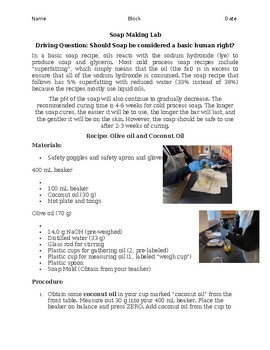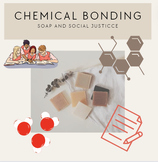Chemical Bonding: Soap Making Lab
Noel Rods
1 Follower
Grade Levels
9th - 12th, Homeschool
Subjects
Resource Type
Standards
NGSSHS-PS1-3
Formats Included
- Word Document File
Pages
2 pages
Noel Rods
1 Follower
Also included in
- Use the unit of chemical bonding to introduce the question: "should soap be considered a basic human right?". Help students engage in social justice matters using their science background and making their learning relevant, relatable and culturally responsive by making personalized soap bars. They cPrice $35.00Original Price $42.00Save $7.00
Description
This lab is part of the Chemical Bonding unit that uses the chemistry of soap to introduce the social justice question: "Should soap be considered a basic human right?" Students can use this lab to make soap and sell them to raise money for a charity, or students can make the soap to give away to a shelter in need. This is an excellent way to make chemistry relevant, relatable and culturally responsive.
Total Pages
2 pages
Answer Key
N/A
Teaching Duration
1 hour
Report this resource to TPT
Reported resources will be reviewed by our team. Report this resource to let us know if this resource violates TPT’s content guidelines.
Standards
to see state-specific standards (only available in the US).
NGSSHS-PS1-3
Plan and conduct an investigation to gather evidence to compare the structure of substances at the bulk scale to infer the strength of electrical forces between particles. Emphasis is on understanding the strengths of forces between particles, not on naming specific intermolecular forces (such as dipole-dipole). Examples of particles could include ions, atoms, molecules, and networked materials (such as graphite). Examples of bulk properties of substances could include the melting point and boiling point, vapor pressure, and surface tension. Assessment does not include Raoult’s law calculations of vapor pressure.





